


The Jawabdehi Yatra is a campaign to bring a Social Accountability Law. Organised by Mazdoor Kisan Shakti Sangathan (MKSS), DEF has been a part of this campaign for a long time. The success story of the RTI (Right to Information) movement has served as the foundation upon which the citizens are pushing the government to follow up on these laws even today. The Right to Information Act 2005 is now acknowledged to be a transformatory legislation by vesting power with the people. Its basic architecture has ensured that the ordinary Indian citizen has managed to use it to overcome resistant pockets of power, to ensure implementation. Read More



Digital gender divide and the role of digital empowerment in women entrepreneurship were some of the key topics of discussion at the virtual launch of ‘World Wide Women - A Campaign on Women's Digital Leadership’ by the High Commission of Canada and Digital Empowerment Foundation. Abhishek Singh, CEO, MyGov India, Osama Manzar, Founder and Director, Digital Empowerment Foundation, and Amanda Strohan, Canadian Deputy High Commissioner, were part of the virtual launch of the campaign. The campaign that was launched ahead of the National Girl Child Day on January 24 aims at training 15 young women and girls from rural and marginalised communities in five Indian states, and some areas of Nepal and Bhutan. Read More



$200,000 to extend Internet access for the tea tribe community (Adivasi) in India’s Assam State, who face one of the lowest levels of access and digital coverage in the country. The project will run Internet access points through Community Internet Libraries (CILs) in the tea gardens, boosted by mobile data network and Wi-Fi zones, effectively serving local needs for access, information, and linkages to opportunities. $200,000 in funding to deliver free, high-speed Internet service to low-income residents in Baltimore City, Maryland (US), where roughly 41% of residents lack home Internet connections. This project will be delivered through Project Waves, an organization committed to bridging the digital divide in Baltimore and beyond. Read More
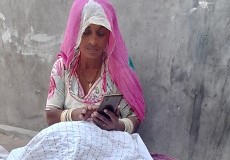
Indra Devi is an artisan from Daydosar village in Barmer district of Rajasthan. She didn’t know how to use a smartphone and when her neighbour told her about DEF’s centre in the village she was excited to learn something new. She joined the digital training program after having a conversation with the centre coordinator. She was excited to learn about something she had been hearing about for the past couple of years, especially since the start of the pandemic. She wanted to know what she was missing out on by not going online. Through the training program she learnt about online payments like Google Pay, PhonePe etc and she learnt how to receive and send money using these platforms. Read More

Deepali Devi, a resident of Meerapur village in Barabanki, Uttar Pradesh does embroidery work and runs it like a small enterprise. She has been receiving training on digital tools from DEF’s trainer Meenu Soni. Deepali is a student and it’s her mother who does the embroidery work, she has slowly gained an interest in it and helps her in her free time. Deepali was very interested in digital tools and joined the training program even though she didn’t have a smartphone. Seeing her interest and enthusiasm, Meenu, her trainer gave her old smartphone to Deepali. Once Deepali had a smartphone she was able to practically understand and practice what she would learn in the training. Read More


K Havila is a student of class nine and she has been receiving STEM education through DEF’s intervention in her school in Baddenapalli, Telangana. She has written her experience of being a part of the STEM program. “STEM education has been very useful to me, I have learnt the scratch program. I had no idea about computer coding earlier, in fact I didn’t even know how to use a computer. Somehow, I started attending the STEM online classes and learnt a lot of useful lessons. Slowly I learnt coding through the scratch program. I have also created many scratch projects. Something completely new that I have learnt is gender awareness and I have come to realise how important it is in today’s world. Read More
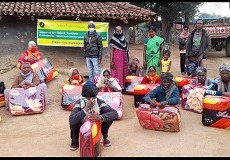
Sanjay Ram is working as a volunteer under DEF’s Risk Communication & Community Engagement (RCCE) program. He has been spreading awareness amongst people about the COVID-19 virus and the methods one must adopt to avoid it. He has been working hard towards fighting misinformation about the vaccine and trying to get more people to take the vaccine. He has created a group of 10 youngsters, they’re all in the age group 15-29. They are the ones helping him spread awareness about the virus. He along with his cohort of 10 youngsters takes part in COVID relief activities organised in his region. He has been a part of major vaccination drives, mask distributions and other relief efforts. Read More

This is the story of Aparna, a student in the Digital Literacy for Women and Girls program. She has narrated her experience during the program: My name is Aparna and I am 17 years old. I had little to no knowledge about computers as earlier I had received some training in school but had forgotten as I wouldn’t be able to regularly use it. I got into the mainstream education and forgot all about computers; my only focus was on getting good grades. My digital knowledge was limited to WhatsApp and Facebook. Due to COVID my school was shut and one of my friends told me about the digital literacy program. I though I could use this time well instead of just sitting at home and doing nothing. Read More
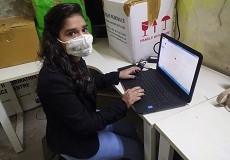
This is the journey of Khushi Gupta, a 16-year-old resident of Ghazipur village, she has narrated her experience of being a part of the digital literacy program and how it has shaped her life. I am Khushi Gupta, I study in class 10 and live in Ghazipur village. We have a television and a mobile phone at home but it is mostly used by my father. Before the COVID-19 pandemic I never though of using digital devices, I was not curious about them at all and had absolutely no interest or inclination. But during the pandemic it turned out to be the most basic thing that a student would need; all the physical classes stopped and they shifted to online platforms. Read More


Pawan Kumar, a 25-year-old from Sultanpuri in New Delhi comes from a financially backward family. He is suffering from an intellectual disability and wasn’t sure if the vaccine was safe for him. He believed that it would have negative side effects on him. However, he along with his family wanted to find out the truth and asked around. Unfortunately, some of the people they met discouraged him from taking the vaccine saying that it is life threatening for persons with disabilities. One of DEF’s coordinators met Pawan and his family during his visit and told them about the importance of taking the vaccine. However, he could not make them believe that the vaccine was completely safe for PwDs. Read More

“Digital Rights Explored: Local Rights, Global Perspective”, is a podcast series hosted by Media and Information Literacy Expert Network (MILEN) which revolves around some case studies of violations of digital rights across different countries and discussions with the experts from the field on the possible solutions to address the consequences. One of the episodes presented case studies of the implications of public policies relating to the internet from Malaysia and India and the experts talked about the role of Internet Governance Forum (IGF). One of the experts who participated was Osama Manzar, founder and director of Digital Empowerment Foundation, bringing out the topic of the Unique ID system through several case studies collected and experienced through village... Read More
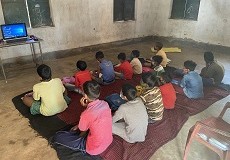
This travelog is about traveling by road, day and night, with people to publicly talk to the government in Rajasthan about the meaning of daily harassment of basic rights of the masses because of the non performance, unaccountability and delayed services that each and every government official must provide as per the constitutional right of the country. Let me tell you first who I am. I am Saleem. I live and hail from a remote village in Bharatpur in Rajasthan. I am 26 years old and I work with Digital Empowerment Foundation as a Project Officer and my daily job is to ensure that all my fellow citizens in my area are literate and aware enough to demand and get their rights and deserving services. And the means are that we have several broadband enabled digital resource... Read More


The tea tribes of Assam are 65-lakh people who are descendants of Adivasis largely from the Chotanagpur region in present-day Jharkhand brought by the British Raj as indentured labourers in the mid-nineteenth century. Over the years, the plight of the tea community has been largely documented. The socio-economic and political vulnerabilities faced by the tea tribe of Assam needs no introduction. But the globalized 21st century and the recent coronavirus pandemics have brought in the importance of a digitalized world. However, the digital exclusion that the tea community of Assam faces has hardly been mentioned or documented. Read More

On the 26th of the last month, in Barmer, Rajasthan, Amran Ram Godara, an RTI activist, was abducted and assaulted. "He suffered multiple injuries; his hand was fractured, nails were shot into his legs and he was forced to drink a bottle of urine," said the news report. Godara is one of the several hundreds of RTI activists who have been attacked for demanding information. The Commonwealth Human Rights Initiative Hall of Shame tracks and lists these attacks. They note 96 such violent incidents that have happened since 2011. The Right to Information (RTI) Act of 2005 was a landmark law that was passed in 2005 which made previously opaque and inaccessible state records publicly available to citizens upon demanding them. Read More

This week, we continue where we left off in the last chapter on the rising hate in the country. We covered how this was not an isolated phenomenon, and how 'alt-right' groups have been increasing their campaigns of hate. We also saw the reports on TekFog, an app that automated the spread of hatred and online violence. Their third detailed piece explores and exposes how such narratives were peddled and pushed during the 2020 Delhi violence and against the Tablighi during the first year of the pandemic. Four arrests had been made so far in the Bulli Bai case, as we had quoted reports last week. However, what has newly emerged is the unearthing of a cult of online hate, which parallels the 'alt-right' groups of the US. Read More

The new year in India started with yet another online hate crime. An online app that surfaced on the platform GitHub did a mock auction of Muslim women activists, journalists, lawyers and student leaders. This is happening six months after a similar application had come on the same platform, with little action taken by the authorities. Women lawyers had written a letter to the Chief Justice of India asking the judiciary to take cognisance of the matter: "We believe that the “Bulli Deals” App happened because no one was punished for Sulli Deals. Although FIRs had been previously registered in the matter of Sulli Deals, no one was arrested and the investigation has been a non-starter... Read More

As we move yet another year into the pandemic, we look back to see that 2021 was marked with issues of access and exclusion, as ever. Even as education and work continued to be online just as it was in the previous year, 2021 also saw the increasing digitisation of health, along with fatal examples that the lack of connectivity brought. 2021 also saw frequent internet shutdowns across the country, from Kashmir to New Delhi's highways. The year also saw huge data breaches, violations of privacy, and online hate targeted at marginalised communities by explicitly violating their privacy. It also saw numerous anti-people bills passed in the parliament hastily while ignoring all opposition. Read More


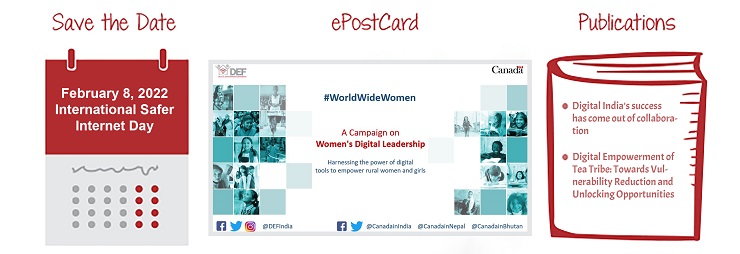

This month we have produced the following four videos. Two of them are about Samarth SoochnaPreneurs who are Differently-Abled Entrepreneurs who have taken the responsibility to digitally empower the community and provide government entitlements to everyone in their respective villages. The third video is about DEF's intervention through Community Networks in Nuh, one of India's most backward districts.

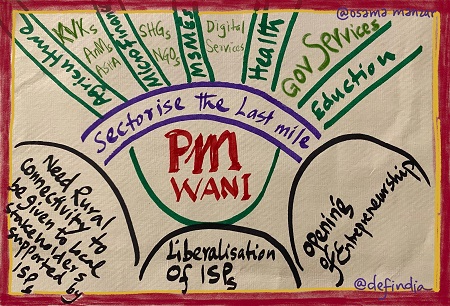

When the lockdown was first imposed in March 2020 and everything was shut down, rural and remote India was the worst hit. Unlike the urban populations, people from rural and remote locations in India didn’t have access to fast-speed Internet connectivity, many of them did not possess a digital device per household member or have access to the many mobile apps that made the stay-at-home a little more bearable for their urban counterparts. Transitioning to online banking, grocery and food delivery or work from home didn’t come as easy to them. This population was not just unable to access services but was also ignored by the systems largely, leading to their further marginalization due to reverse migration, loss of livelihood, poor access to health care, reduced access to food supplies and disconnect from educational opportunities, among others. In 2021, the situation was worse. With the pandemic entering Year 2, rural and remote populations saw their economic capacity dip even further, their quality of life deteriorate even more and their access to basic and essential services made almost impossible. Read More
With the onset of the third wave we are crowdfunding digital devices so that underprivileged students are not deprived of education like they were during the first two waves of the pandemic.
info@defindia.org | def@defindia.net


